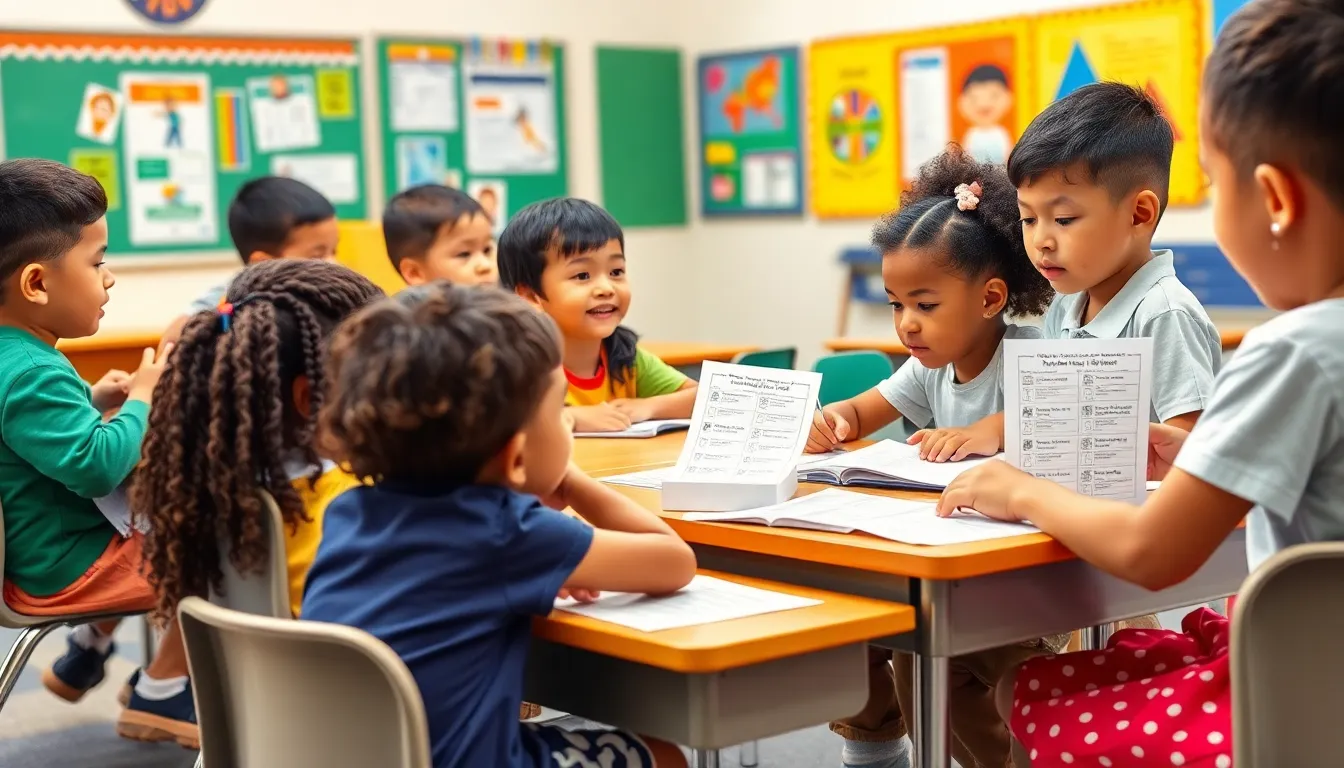As the school bell looms closer, parents often find themselves in a whirlwind of excitement and anxiety. Is little Timmy ready to tackle math problems and read books thicker than a pancake? School readiness assessments swoop in like superheroes, helping parents gauge if their tiny tots are set for the big academic adventure ahead.
Table of Contents
ToggleUnderstanding School Readiness Assessment
School readiness assessment plays a crucial role in gauging a child’s preparedness for school. These evaluations help parents and educators identify strengths and areas needing improvement.
Definition and Purpose
A school readiness assessment evaluates a child’s developmental milestones in areas like cognitive skills, emotional regulation, and social interactions. This tool aids in determining if children possess the necessary skills for a smooth transition into formal education. Understanding these assessments allows parents to make informed decisions regarding their child’s readiness. Early identification of gaps enables focused support tailored to each child’s unique needs.
Importance in Early Childhood Education
Importance of school readiness assessments becomes evident in their role in early childhood education. These assessments provide insights that guide curriculum development to meet diverse learning needs. Educators utilize the information to create targeted interventions, enhancing children’s developmental progress. Furthermore, assessments foster collaboration between parents and schools, ensuring a supportive environment. Engaging parents in their child’s educational journey supports positive outcomes. Ultimately, readiness assessments contribute to laying a strong foundation for lifelong learning success through structured guidance and support.
Types of School Readiness Assessments

School readiness assessments come in various forms, each serving a specific purpose in evaluating a child’s preparedness for school. Understanding these types aids parents and educators in making informed decisions.
Standardized Assessments
Standardized assessments provide a uniform measure of a child’s readiness. These tests often gauge cognitive skills, language abilities, and social-emotional development. Typically administered in a controlled environment, they produce consistent results that allow for comparison across different populations. Many schools use these assessments to evaluate students’ academic capabilities against established benchmarks. While standardized tests offer valuable data, they may not fully capture a child’s unique strengths or challenges.
Developmental Checklists
Developmental checklists focus on key milestones that children should achieve by certain ages. These checklists cover various domains, including motor skills, language development, and social interaction. Parents and educators can use them as practical tools for tracking a child’s progress over time. Such assessments facilitate a clear understanding of a child’s developmental trajectory and highlight areas that may need additional support. By engaging with these checklists, parents can identify whether their child is on track or if intervention is necessary.
Key Components of School Readiness
School readiness encompasses several critical components that contribute to a child’s successful transition into formal education. Assessments provide valuable insights into these areas.
Cognitive Skills
Cognitive skills form the foundation for academic success. They include abilities such as problem-solving, memory, and critical thinking. Children who demonstrate strong cognitive skills can understand instructions, follow multi-step directions, and engage in thoughtful discussions. Engaging in age-appropriate activities, games, and puzzles supports the development of these skills. Parents and educators can use standardized assessments to evaluate proficiency in this area, identifying strengths and weaknesses. Recognizing these cognitive milestones enables parents to tailor learning experiences, ensuring children are prepared for classroom challenges.
Social and Emotional Development
Social and emotional development plays a crucial role in school readiness. Emotional regulation, empathy, and cooperation are essential skills for navigating a school environment. Children adept in these areas interact positively with peers and adults, managing their emotions effectively. Engaging in group activities, role-playing, and discussions about feelings helps foster these competencies. Observing how children react to various social situations offers insight into their readiness. Assessments that focus on this domain highlight areas that require support, enabling parents and educators to nurture healthy social-emotional development in preparation for school.
Implementing School Readiness Assessments
Effective implementation of school readiness assessments is essential for fostering academic success. These assessments provide valuable insights into a child’s developmental readiness and optimal strategies for support.
Best Practices for Educators
Educators should utilize a combination of assessment tools to provide a comprehensive view of each child’s abilities. Incorporating both standardized assessments and developmental checklists allows for a well-rounded evaluation. Observing children in natural settings enhances the understanding of their social interactions and emotional responses. Integrating play-based activities into assessments encourages genuine engagement. Regularly reviewing assessment results ensures timely identification of areas needing support. Tailoring interventions to meet individual needs optimizes developmental outcomes.
Engaging Parents and Caregivers
Active involvement of parents and caregivers enhances the effectiveness of school readiness assessments. Sharing assessment results with families encourages open communication and collaboration. Providing resources and strategies for at-home support empowers parents to contribute to their child’s development. Workshops on child development topics can deepen understanding and strengthen partnerships between educators and families. Regularly inviting feedback from parents fosters a collaborative environment. Engaging parents in the assessment process reinforces their crucial role in supporting school readiness.
School readiness assessments are vital tools that empower parents and educators to understand a child’s development. By evaluating cognitive skills and social-emotional growth, these assessments provide a comprehensive view of a child’s preparedness for school. Engaging with various assessment methods can help identify strengths and areas for improvement, ensuring children receive the support they need.
Collaboration between parents and schools is essential in this process, fostering a nurturing environment that promotes lifelong learning. As parents become more informed about their child’s readiness, they can make proactive decisions that enhance educational outcomes. Ultimately, embracing school readiness assessments lays the groundwork for a successful academic journey.
